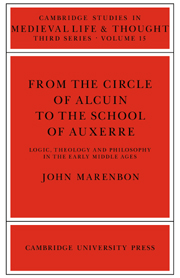 From the Circle of Alcuin to the School of Auxerre
From the Circle of Alcuin to the School of Auxerre Book contents
- Frontmatter
- Contents
- Acknowledgements
- Introduction
- 1 Aristotle's Categories and the problems of essence and the Universals: sources for early medieval philosophy
- 2 Logic and theology at the court of Charlemagne
- 3 Problems of the Categories, essence and the Universals in the work of John Scottus and Ratramnus of Corbie
- 4 The circle of John Scottus Eriugena
- 5 Early medieval glosses on the problems of the Categories
- Conclusion
- APPENDIX 1 Texts from the circle of Alcuin
- APPENDIX 2 A Periphyseon florilegium
- APPENDIX 3 Glosses to the Categoriae Decem
- Bibliography (including index of manuscripts and list of abbreviations)
- Index
4 - The circle of John Scottus Eriugena
Published online by Cambridge University Press: 24 October 2009
- Frontmatter
- Contents
- Acknowledgements
- Introduction
- 1 Aristotle's Categories and the problems of essence and the Universals: sources for early medieval philosophy
- 2 Logic and theology at the court of Charlemagne
- 3 Problems of the Categories, essence and the Universals in the work of John Scottus and Ratramnus of Corbie
- 4 The circle of John Scottus Eriugena
- 5 Early medieval glosses on the problems of the Categories
- Conclusion
- APPENDIX 1 Texts from the circle of Alcuin
- APPENDIX 2 A Periphyseon florilegium
- APPENDIX 3 Glosses to the Categoriae Decem
- Bibliography (including index of manuscripts and list of abbreviations)
- Index
Summary
In the last three chapters, I have traced the development of a group of ideas and methods from the time of Charlemagne to that of Charles the Bald. In the final chapter, I will examine one of the principal routes by which these ideas were disseminated and developed during the course of the tenth and the eleventh centuries. At the centre of this story will have been John Scottus. His Periphyseon brings to a climax the discussion of the Categories begun in the School of Alcuin; and the scholars of the late ninth and tenth centuries were to turn to this work when they considered the problems of essence and the Universals. In this chapter, therefore, I wish to fill in some of the intellectual background to John's work. The ‘circle of John Scottus’ appears to have occupied as central a position in the philosophical development of the ninth century as its master himself. Who belonged to this circle and in what did its work consist?
There is good evidence that John's ideas attracted considerable, enthusiastic attention from his contemporaries; but this evidence is scattered and fragmentary. Whenever the possibility that a particular figure was deeply influenced by John's work is raised, it requires only a moderate amount of scepticism to dismiss it. I shall therefore begin by examining a set of material incontrovertibly associated with John: the notes and glosses written in two insular hands, each of which scholars have claimed as John's own.
- Type
- Chapter
- Information
- From the Circle of Alcuin to the School of AuxerreLogic, Theology and Philosophy in the Early Middle Ages, pp. 88 - 115Publisher: Cambridge University PressPrint publication year: 1981


